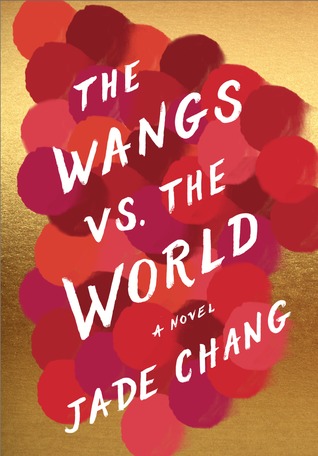 In November, National Book Critics Circle members will begin nominating and voting for the fourth John Leonard award for first book in any genre. In the run-up to the first round of voting, we'll be posting a series of #NBCCLeonard blog essays on promising first books. The eighteenth in our series is NBCC member Yahdon Israel on Jade Chang’s The Wang’s Vs. The World (Houghton Mifflin Harcourt).
In November, National Book Critics Circle members will begin nominating and voting for the fourth John Leonard award for first book in any genre. In the run-up to the first round of voting, we'll be posting a series of #NBCCLeonard blog essays on promising first books. The eighteenth in our series is NBCC member Yahdon Israel on Jade Chang’s The Wang’s Vs. The World (Houghton Mifflin Harcourt).
Every novel is governed by an emotional logic that provides a profound insight into the interior lives of the characters being brought to life on the page. A good novel allows these insights to approximate us to the characters; make us feel like we know them, like they’re real. A great novel takes these insights and gives us the impression that it’s not the characters we know, but the writer who created them. Then there’s the exceptional novel that turns these insights on themselves, allowing us to see what we seldom admit we’re looking for every time we open a book: ourselves.
To not make us feel guilty, or aware, of the impulse is an act of empathy. A quality many writers pontificate about needing but very few have. When you read Jade Chang’s The Wang’s Vs. The World you’ll see that Chang is of a silent minority of writers who understand that empathy is more than a watchword; it’s a lighthouse.
Empathy is what guides Charles Wang, a Chinese-American businessman whose cosmetic empire collapses during the 2008 recession, on a trip across America to in order to reclaim his family’s ancestral land back in China for him and his three children—Saina, Andrew, and Grace. Land that was taken by China’s Communist government. How a man comes to convince himself that this mission is possible gives us a glimpse as to how he lost his money in the first place. But it also makes us want to know what type of man Charles is:
“Artifice, thought Charles, was the real honesty. Confessing your desire to change, being willing to strive, those were things that made sense. The real fakers were the ones who denied those true impulses. . . Everyone must want to be beautiful. . . And for a time, a long and lucrative time, the good people of America had agreed.”
Understanding a character is a matter of figuring out what motivates them; what they think they want; and what they’re afraid of losing. Long before Charles Wang arrived on the shores of America you can see that Charles is motivated by the trauma of having what he felt was rightfully his taken from him and his family back in China. He attempts to enact his vengeance on China by becoming successful in America, reminding me of what James Baldwin said in regards to his self-imposed exile to Paris; about it never being about where he was going but what he was attempting to get away from.
In more ways than we can express, home hurts. It’s why none of the Wangs live at home with their father. Saina, the oldest, lives in upstate New York after torrid love affair with the art world. Andrew, his only son, attends college in Arizona. And his youngest, Grace, is in boarding school. Charles’s wife Barbra lives with him, but only in the flesh. Charles’s heart, mind and soul has been everywhere but with her. This all changes when Charles loses nearly all of his material possessions. It’s no longer about selling dreams to people who lose sleep trying to achieve them. Charles just wants to go home, and he wants his family to go with him. It’s at a price he can barely afford—beyond any monetary costs—but Charles foots the bill. To him it’s worth it:
“As Grace and Barbra weep and Andrew clutches his hand and Saina gestures at the doctor to hurry, he smiles at them and watches their faces bloom with relief. He smiles again and pings back their love as hard as he can while also focusing on speaking the truth he has known for so long, the truth that will make the whole world theirs.
‘Daddy discovered America!’
He leans back, triumphant, exhausted. Later, they will learn how to rule the new world but for now, this is enough. This is everything.”
Just as funerals have their way of bringing the estranged family back from the dead, financial ruin as well as the moral bankruptcy of the American Dream becomes Chang’s way of showing, “In the end, all we had were the people to whom we are beholden.” Money, power and fame, for all they’re worth, will never change that.
Yahdon Israel is a 26 year-old writer from Bed-Stuy, Brooklyn, who writes about race, class, gender and culture in America. He has written for Avidly, The New Inquiry, ESPNW and Brooklyn Magazine. He's a contributing editor at LitHub; recently graduated with his MFA in Creative Non-Fiction from the New School, and runs a popular Instagram page which promotes literature and fashion under the hashtag, #literaryswag. Above all else: he keeps it lit.

